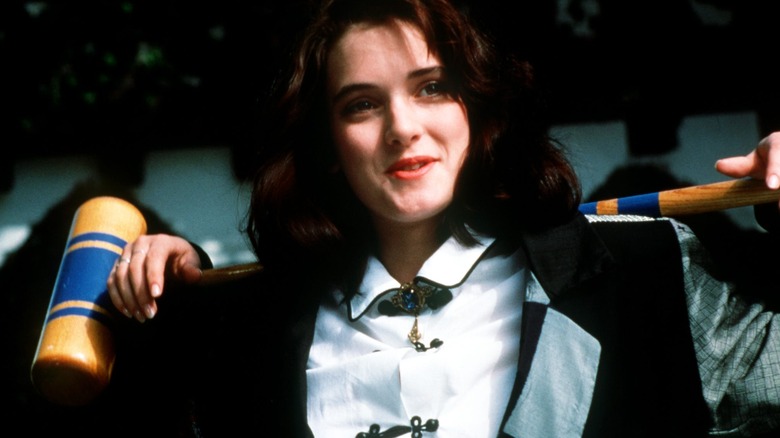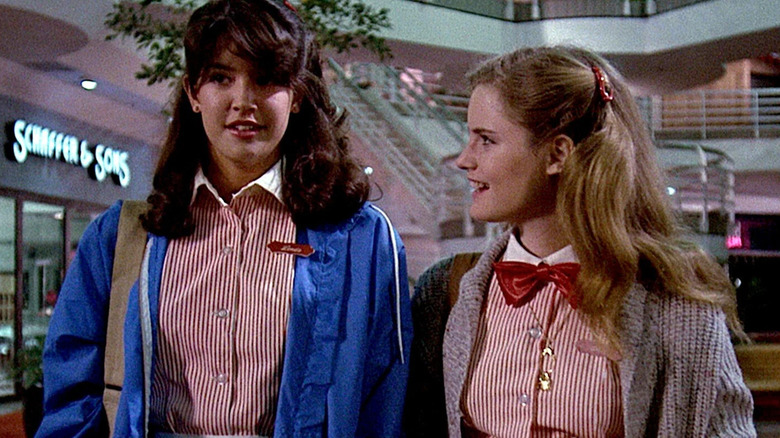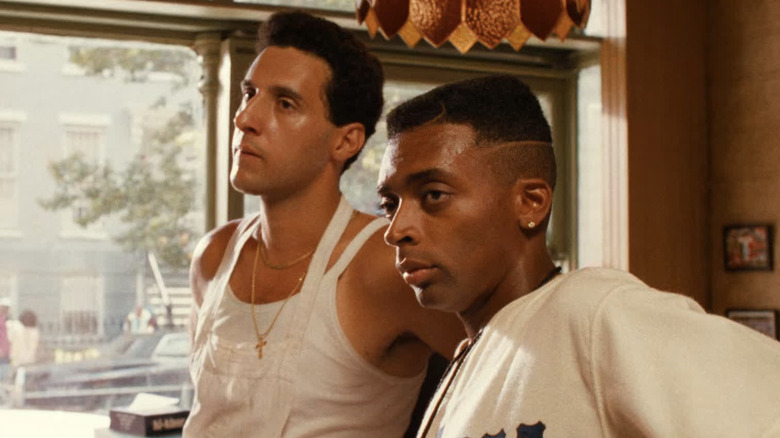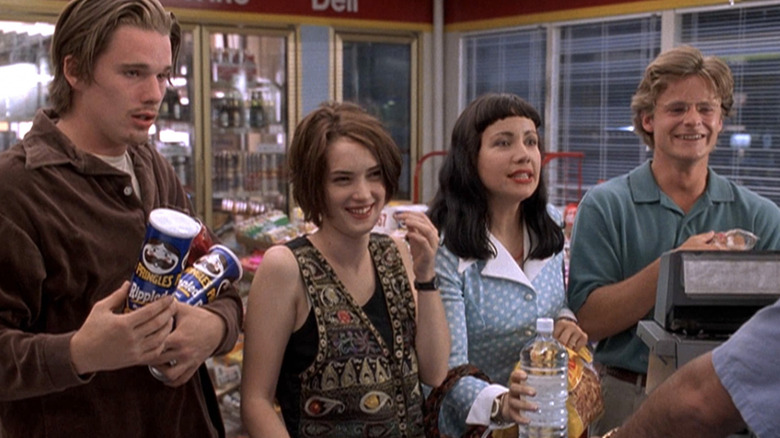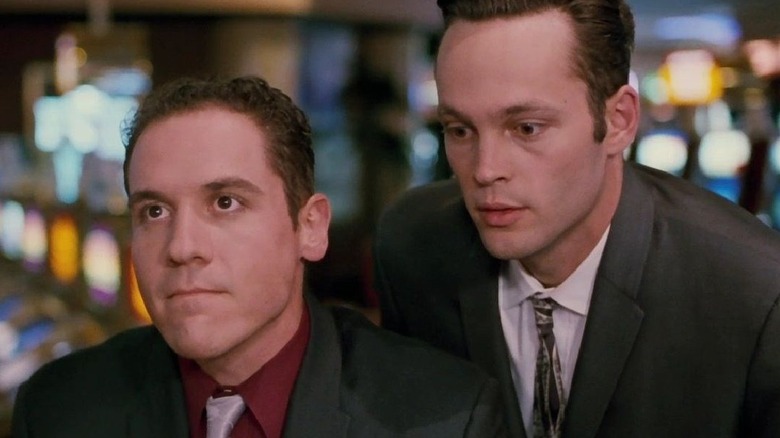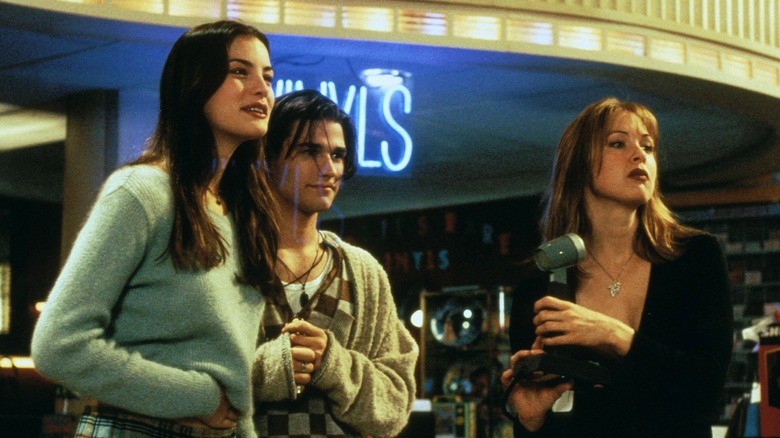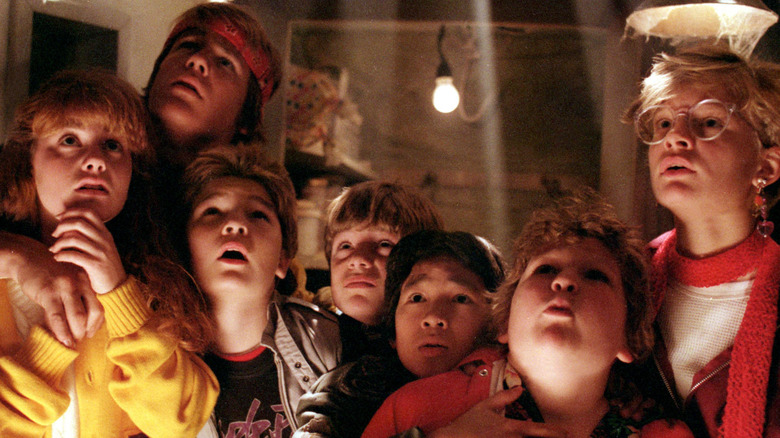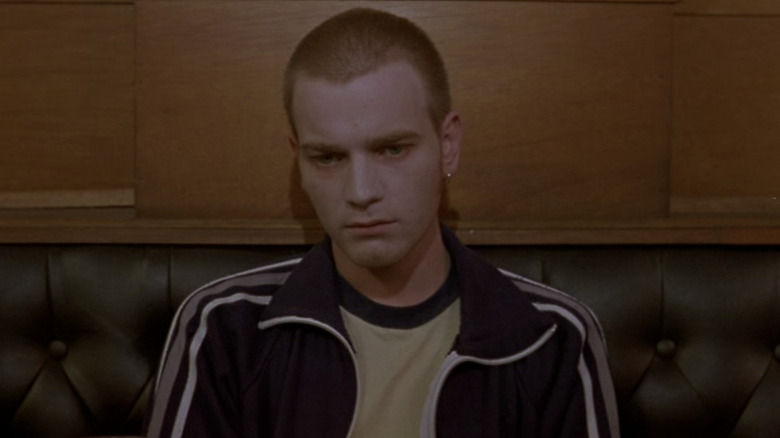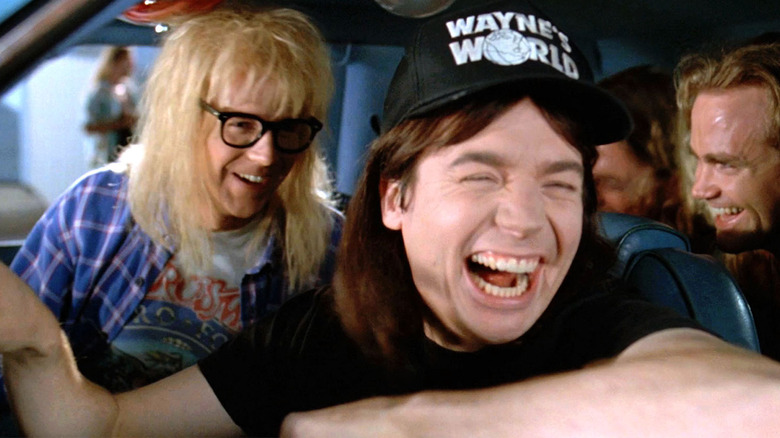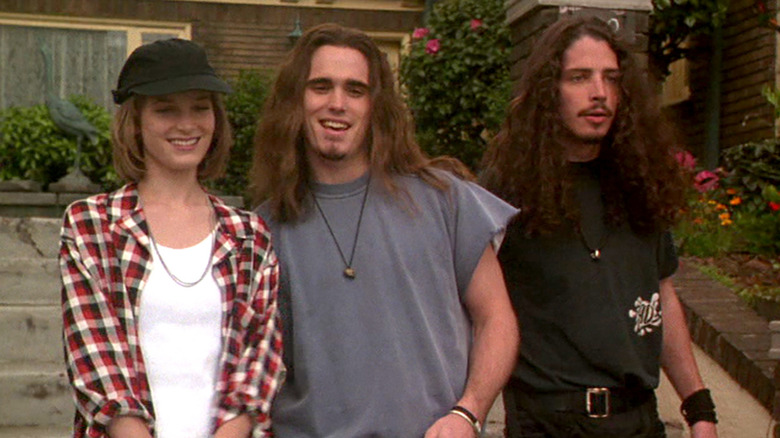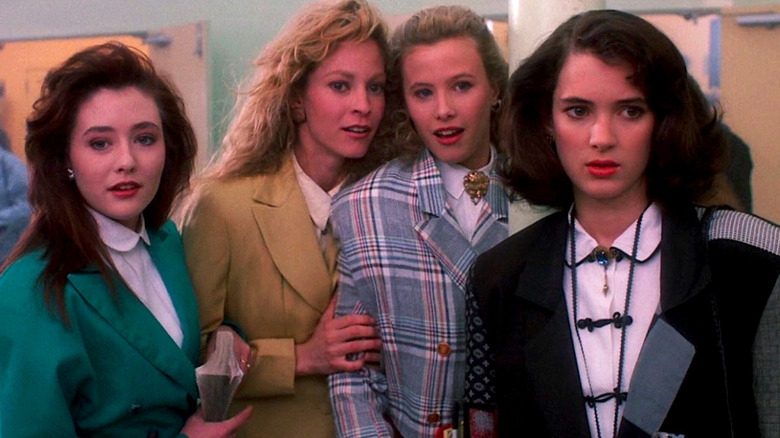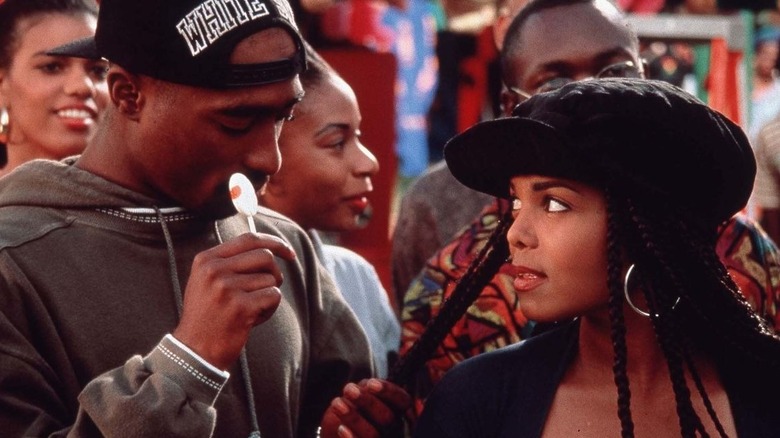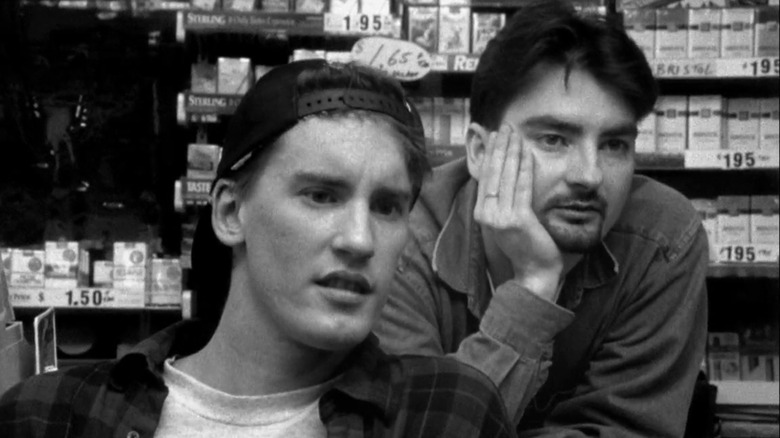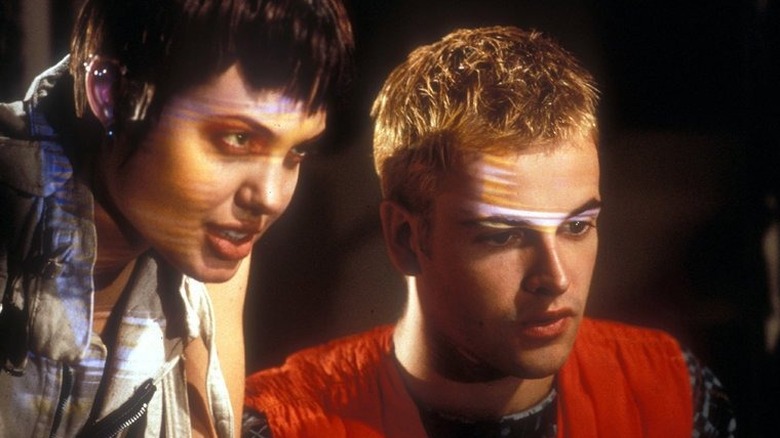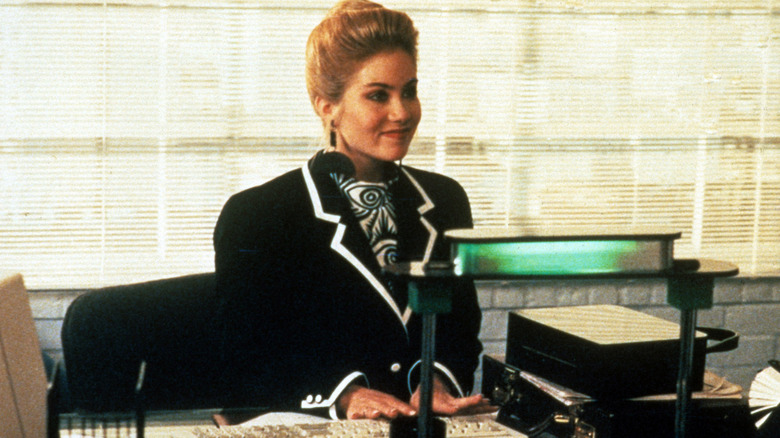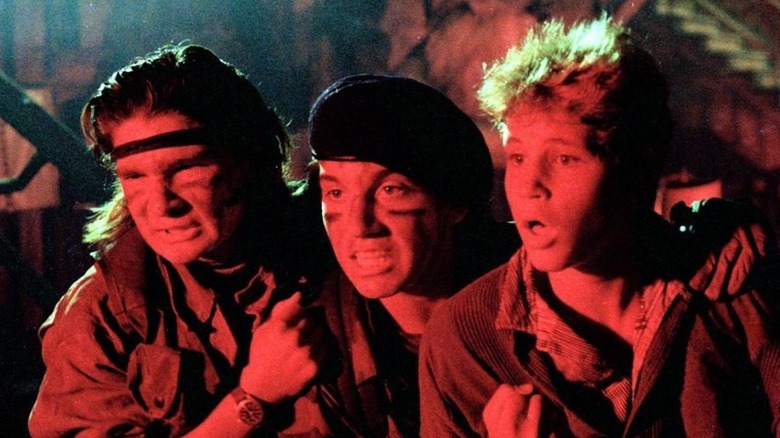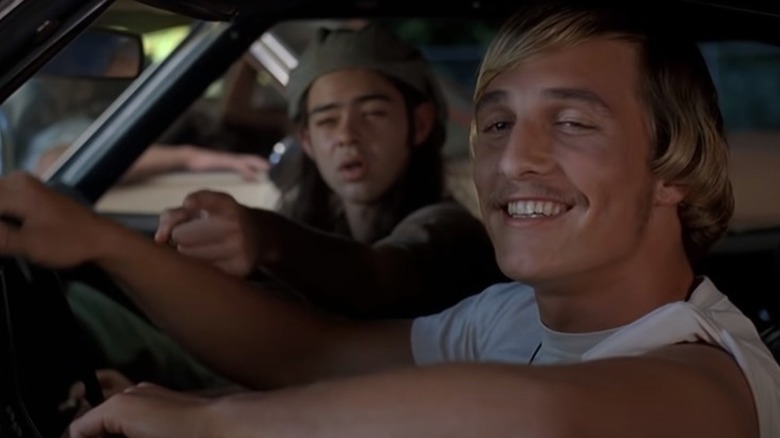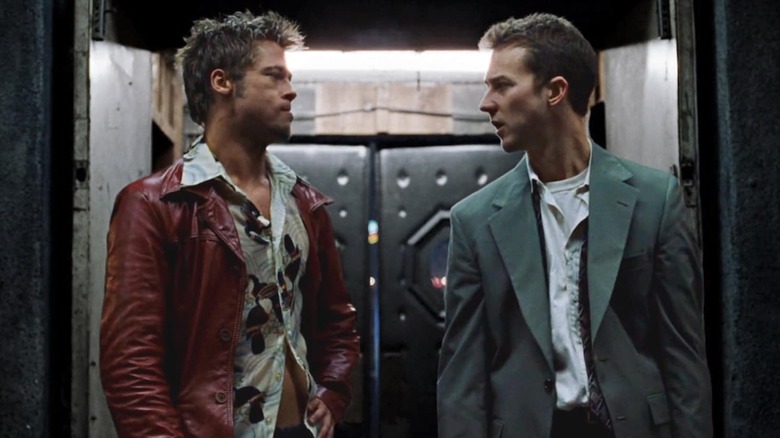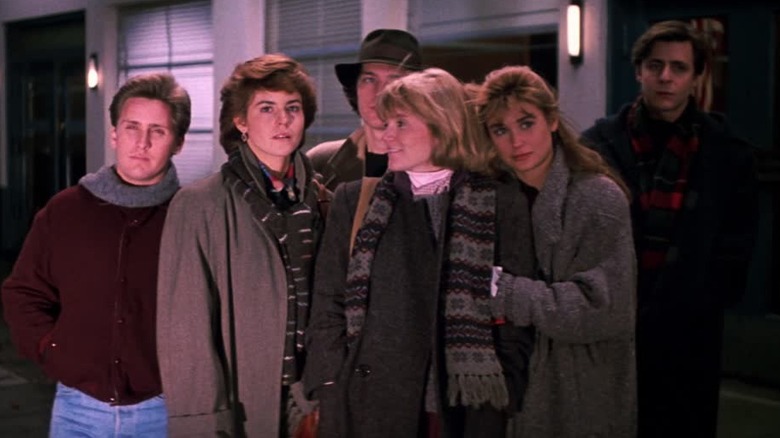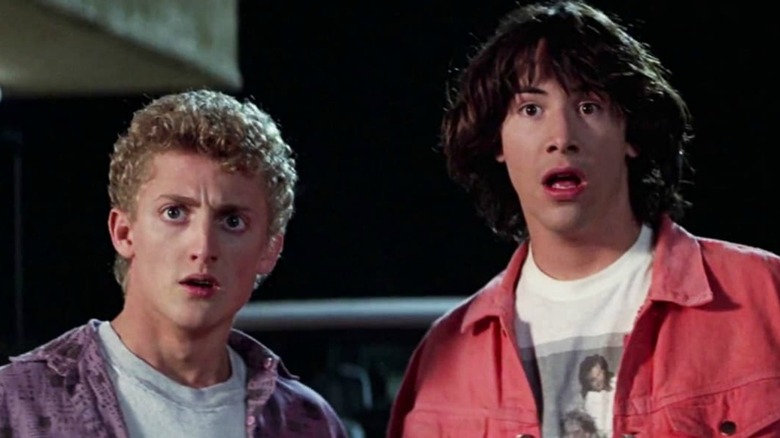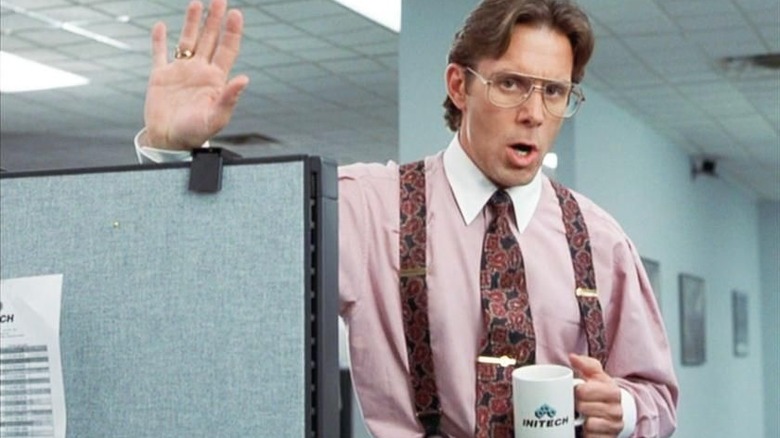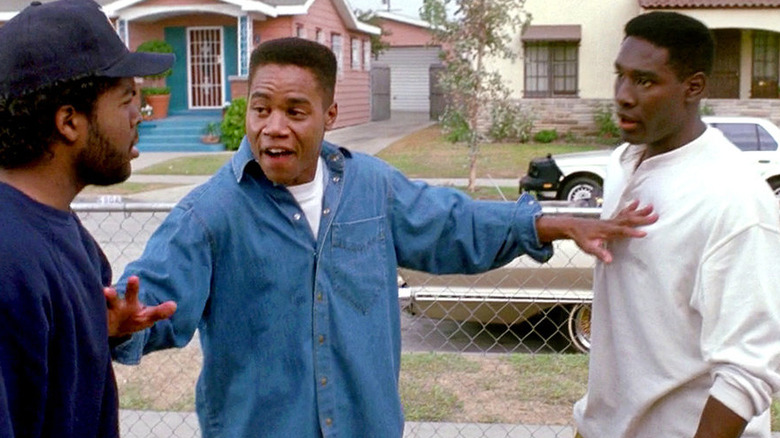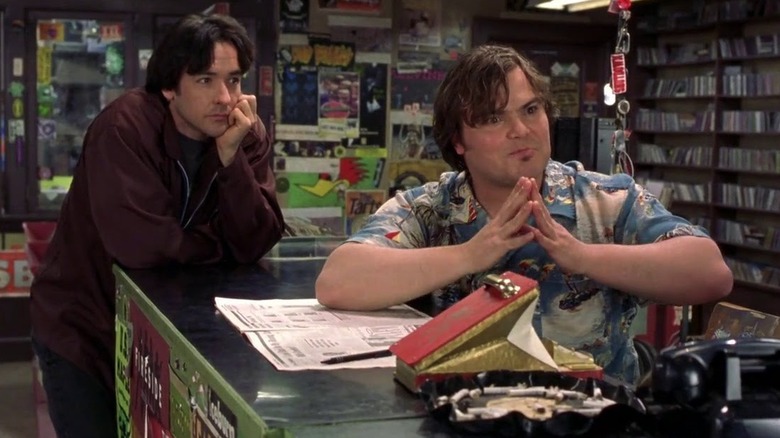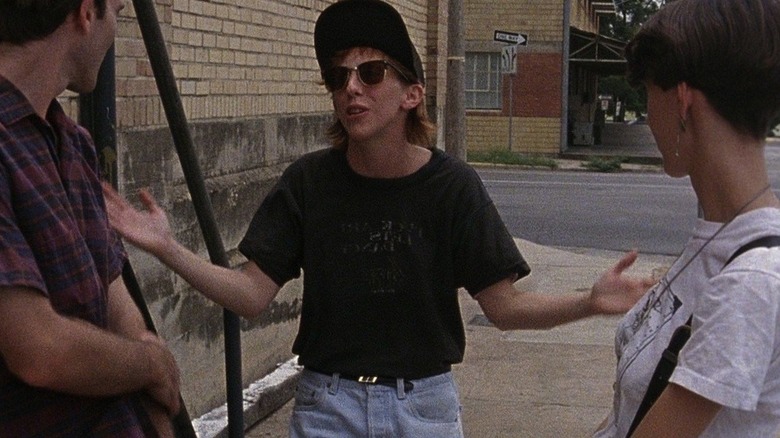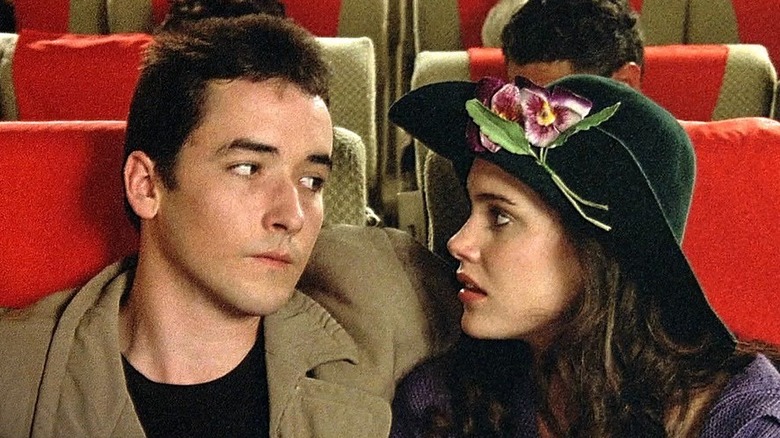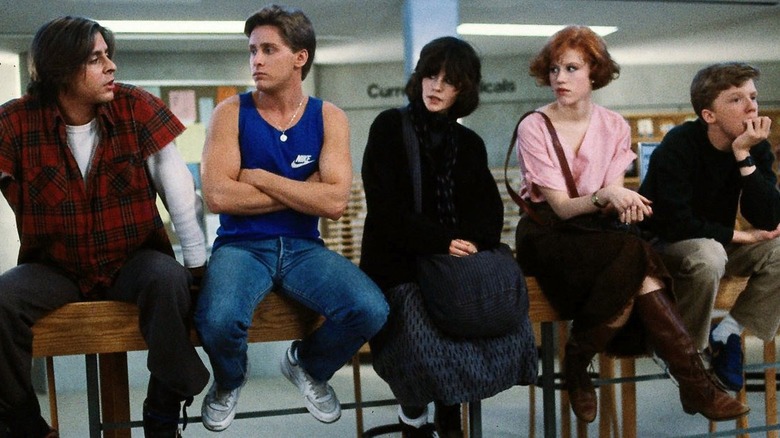25 Movies That Defined Generation X
There are no definitively agreed upon years to define any given generation, but the people who comprise Generation X are generally considered to be those who were children in the 1970s and 1980s, entered their teen years in the '80s and '90s, and were adults around the time of the millennium (via Britannica). Other nicknames for that demographic are the "latchkey generation" — because they often came home to empty houses and had to use their keys to let themselves in — and the "MTV Generation," as many of them grew up alongside the cable network, which defined pop culture in this era (via BridgeWorks).
Gen Xers are often associated with cynicism, as they grew up in a time where the values of capitalism were heightened and it felt like everything was seen as a commodity or marketing opportunity for the Baby Boomer generation that preceded them. At the same time, things like the AIDS epidemic and the rise of drug use also contributed to the sense of malaise that Gen Xers often felt.
But it's not all bad news, as Gen X was also the generation of great indie films, the introduction of home computers/the internet, and a thriving economy (for a time). And all of this — the good and the bad — informed the films that were made by and/or for Gen Xers, so these are the ones that best represent the various aspects of Generation X.
Fast Times at Ridgemont High
According to Harvard's Joint Center for Housing Studies, the oldest Gen Xers were born as early as 1965, which would've put the first batch of them in the teenage workforce by the early-'80s. These elder Gen Xers are the focus of the Amy Heckerling's classic "Fast Times at Ridgemont High," written by the voice of the generation, Cameron Crowe. The movie follows a group of teenagers, as they navigate relationships and school, all while dealing with their minimum wage jobs.
The shopping mall was one of the biggest social centers for Gen X teens, and few movies have represented mall culture as well as "Fast Times" does. While this is an ensemble piece, it centers around 15-year-old Stacy (Jennifer Jason Leigh), who loses her virginity and then has to deal with the ways that the milestone changes her and her relationships with those around her.
It's a journey that many kids have had in every generation, but each one has a slightly different attitude to relationships and "Fast Times" absolutely nails how it was viewed by the first Gen Xers to hit puberty. Speaking of which, many a Gen Xer felt certain feelings for the first time during the movie's legendary pool scene that features dream girl Phoebe Cates.
Do the Right Thing
As each generation starts to come into their own in their late-teens/young adult years, they inevitably begin to clash with the ideals of the generation that directly proceeded their own — in other words, their parents, teachers, bosses, or any figure of authority.
"Do the Right Thing" sees that clash play out in an intense fashion. It shows multiple generations butting heads, as it centers around the young black residents of a Brooklyn neighborhood feeling as though they're being treated as outsiders by the Italian-Americans that share the neighborhood.
This third feature-length directorial effort from Spike Lee was definitely his breakthrough film, which frequently shows up on lists of the best movies ever made by such distinguished outlets as the American Film Institute. "Do the Right Thing" captured an anger that many young people of Generation X felt about living in the shadow of the Civil Rights Movement, rather than in a new reality these changes were supposed to create (per Dissent Magazine).
The optimism and hope of the civil unrest and societal upheaval of the '60s gave way to the truth that the next generation — Gen X — lived in a world where racism still permeated every facet of American life. "Do the Right Thing" was — and still is — a powerful lesson in anger and frustration with the status quo.
Reality Bites
"Reality Bites" is the feature length directorial debut of Ben Stiller, whose "Ben Stiller Show" helped influence the voice of Gen X comedy a few years prior (per Rotten Tomatoes). He has a supporting role here too as Michael, a TV executive, who wants to date Lelaina (Winona Ryder) and feels that her documentary-style footage of her and her friends can be turned into a project for MTV. But the (presumably Baby Boomer) producers he passes the footage to completely miss the point and reduce the whole thing to a bunch of kids who just want to party and eat pizza.
It's not the deepest movie on this list, but in the pantheon of post-college, what happens now? movies that follow a circle of teenage friends trying to cling to their last moments together before life inevitably sends them all in different directions, "Reality Bites" is one of the sweetest and funniest. It captures that universal and timeless existential dread of life after college or just of really entering adulthood and it does so with a very specific 1994 lens. Plus, the movie stars Gen X heroes Ethan Hawke and Janeane Garofalo, which makes the ensemble essentially a who's who of "young Hollywood" at the time.
Swingers
While grunge music is often what first comes to mind when one things of the soundtrack of Generation X, other types of music hit critical mass as Gen Xers were coming into their own. The swing dance music revival of the '90s was very much a Gen X thing, and it permeated not only radio but also every other facet of pop culture for a few years there (per Billboard). A wonderful snapshot of that very specific time and place in the lives of Gen Xers is captured in the movie "Swingers," which for many was an introduction to Jon Favreau (who also wrote the film) and Vince Vaughn.
"Swingers" is far from a novelty film about a relatively short-lived fad, however. It also captures what it was like for Gen Xers, who were just hitting adulthood in the mid-'90s and found themselves in the big, scary world of adult dating for the first time. Mikey (Favreau) has never really learned to date, as he only just recently broke it off with his high school sweetheart. So, he ventures out into the L.A. bar scene with the help of the ultimate team of wingmen led by his pal Trent (Vaughn).
Gen Xers were the last generation to have to look for mates largely without the aid of the internet, and "Swingers" is an excellent depiction of one of the last eras of people having to just go out and talk to complete strangers face-to-face in order to find love.
Empire Records
Music is a powerful way to define and explore a generation and for Generation X, record stores comprised a significant part of its musical identity. One can't talk about Gen X without discussing indie record stores and conglomerates like HMV and Tower Records, all of which were major epicenters of pop culture for a time. The record store was the place where the coolest people worked and hung out. For those fantasizing about working at a record store, it was hard to imagine any place better than the titular "Empire Records."
Considering the entire movie takes place within a single 24 hour period and during just a single shift at the store, it takes a certain suspension of disbelief to accept that an entire checklist of Gen X issues are addressed and largely buttoned up by the end. Still, that the movie balances subplots about addiction, feminism, capitalism, and more, and is able to conclude it all with a rooftop concert, is impressive. Much of that is due to the stellar performances of the young cast that includes Liv Tyler, Renée Zellweger, Robin Tunney, and more.
Of course, you can't talk about "Empire Records" without mentioning Rex Manning (Maxwell Caulfield) or Rex Manning Day. Manning is the perfect caricature of how Gen X viewed the past-their-prime stars from their parents' childhoods and is just one of many elements that makes "Empire Records" a great Gen X film to this day.
The Goonies
There were a lot of great action/adventure movies in the early '80s like "Raiders of the Lost Ark," "E.T.," and "Ghostbusters," but most of them have a more timeless feel and don't particularly seem to belong to Generation X. "The Goonies," on the other hand, is a Gen X adventure movie through and through. It's not just that it features kids as the heroes, but rather, it's that the kids are the perfect cross-section of Gen X archetypes.
"The Goonies" follows a group of friends, whose homes are about to be demolished to make way for a brand spanking new development. With the threat of separation looming large, they embark on one last adventure together after discovering a secret map that leads them on an epic treasure hunt.
Sure, having a group that consists of a jock, a cheerleader, and a gadget nerd might seem like a collection of generic stereotypes. But there are no one-dimensional characters in "The Goonies," and they all come together and learn their appropriate lessons in a completely believable manner. There is something to be said for Gen X's ability to overlap cliques and be much less segregated than previous — or even subsequent — generations, brought together by shared love of new interests like rap, video games, heavy metal, and Dungeons & Dragons. And that is beautifully illustrated by "The Goonies."
Trainspotting
Lest we forget that it wasn't only the United States that had Gen Xers, Danny Boyle's "Trainspotting" — based on Irvine Welch's novel of the same name — presents a uniquely British view of the era and the people that were part of it. And it's probably not surprising that a British filmmaker was the one to show a darker side of Generation X, one that follows a group that has been so thoroughly rejected by/struggles to find their place within society that they turn to crime and excessive substance use just to get by.
Mark Renton (Ewan McGregor) is a heroin user, whose addiction is growing, as his job opportunities are dwindling. His close friends are all drug users as well, and as he tries to get clean, he finds that his friends and his life as he knows it may not be serving him anymore.
According to the BBC, Gen X saw a marked rise in the use of hard drugs and it still remains the generation most likely to lose their lives as a result of drug misuse, and "Trainspotting" captures this aspect of the era. Although "Trainspotting" is largely considered a black comedy — a favorite genre of Gen Xers for sure — there are moments in the film that pull no punches and are still as hard to watch today as they were in 1996.
But beyond the plot and the characters themselves, one of the most enduring legacies of "Trainspotting" is that introduced that loud, frenetic, music video style of filmmaking to the world that came to define movies on both sides of the pond for years to come.
If you or anyone you know needs help with addiction issues, help is available. Visit the Substance Abuse and Mental Health Services Administration website or contact SAMHSA's National Helpline at 1-800-662-HELP (4357).
Wayne's World
Although Lorne Michaels and the early cast members of "Saturday Night Live" are Baby Boomers, the show was a favorite for Gen X kids, who then grew up into the next generation of both fans and stars of the show. There's no question that the "Wayne's World" sketches are definitely poking some fun at the slacker nature of Gen X bros — Wayne (Mike Myers) still lives with his parents, something he himself admits is "both bogus and sad" — but Myers and Dana Carvey are also mostly paying loving tribute to a generation that just wanted to party on.
Barely five minutes can go by in the original "Wayne's World" film — which centers on the duo's impulsive sale of their public access show to a big-shot producer only to realize what comes with selling out — before some iconic line or moment happens that became a permanent part of pop culture within days of the movie's release. But beyond being an almost flawless comedy, it doesn't get enough credit for what a wonderfully Gen X film it is.
To be clear, it leans a little toward older Gen Xers like the ones who were more into Aerosmith and Metallica than Nirvana and Pearl Jam. But Gen Xers were among the last group to grow up without the prevalence of cell phones or social media. So for many Gen X folks, Friday night often meant piling into someone's car with no destination in mind and driving around until they found their friends milling about outside of a bar or somewhere else. That was the adventure for the evening and that's part of what "Wayne's World" captures so well.
Singles
For many, "Singles" is a grittier and more honest version of what "Reality Bites" was only scratching the surface of. Making his second appearance on this list besides "Fast Times at Ridgemont High," writer Cameron Crowe proved that he could speak to the teenage experience in pretty much any era, as he turned his eye to young folks in the '90s here. He directs this movie too, which is about the trials and tribulations of a group of 20-somethings living in the same apartment building in Seattle.
Basically "The Grunge Era: The Motion Picture," "Singles" came out at the height of not only that genre but also the entire subculture that it inspired. It even went so far as to cast three members of Pearl Jam to portray the movie's fictional band.
It's worth noting, however, that the movie is much more than its stunt casting or its musical elements. Taking place in Seattle's grunge scene might tie it to a time and place (not to mention a certain generation), but it's a fairly evergreen movie about the complicated nature of life and love for anyone in their early 20s.
The title has a clever double meaning of the characters all living in single-bedroom apartments (a.k.a. "singles") and the connotation of the word in regards to songs. And all due respect to Pearl Jam and the other cameos that include Chris Cornell and Tim Burton, but one must give credit where it's due and that belongs to the great performances of Matt Dillon, Bridget Fonda, Kyra Sedgwick, and Campbell Scott.
Heathers
Compared to the previous Baby Boomer generation, Gen X was characterized (at least by others) by angst and cynicism, so perhaps its no surprise that it embraced dark comedies. And few major studio comedies have ever been quite as dark as "Heathers." After a decade of upbeat, optimistic, everyone-learns-a-lesson-and-is-better-for-it teen films, it was perhaps only a matter of time before someone took that concept and subverted it.
"Heathers" is about four girls — three of whom share the then-common titular name — who viciously rule their school. Their clique includes outsider Veronica (Winona Ryder), who's unhappy being on the inside. She meets smooth-talking creep J.D. (Christian Slater), who lures her into his plan of murdering the Heathers and making it appear as though they took their own lives. Did we mention this is a comedy?
According to an oral history of "Heathers" for Entertainment Weekly, the movie was hard to cast due to so many young actors being unwilling to gamble on such dark material. Luckily, the final cast wound up being perfect, as up-and-coming stars like Shannen Doherty joined Ryder and Slater. In retrospect, anyone who passed on the movie likely regrets it now, as "Heathers" is a full-blown cult classic that exaggerates the tension between the misfits and the popular kids in a wonderfully dark way.
To be fair, the movie doesn't feel as "fun" in light of the countless real-life tragedies that have befallen schools since "Heathers" was released, so proceed with caution when watching it with that added baggage.
If you or someone you know is struggling or in crisis, help is available. Call or text 988 or chat 988lifeline.org
Poetic Justice
Rapper Tupac Shakur was only just starting to showcase his immense talents as an actor when his life was cut short at the age of 25 (per The LA Times), and 1993's "Poetic Justice" was one of only a handful of films he completed. The movie saw Janet Jackson in her first film role and since at that point, both were still at the tops of their game in the music world, a fair amount of hype saw them come together to co-lead a film. And that hype proved to be more than warranted.
Shakur and Jackson are electric in this road trip movie set against the backdrop of dealing with the fallout of urban gun violence, as Jackson plays Justice, a poet and hairdresser whose boyfriend has recently been murdered. She ends up bonding and sparking a romance with Lucky (Shakur), who has found himself a single father after his daughter's mom became an addict.
The movie is the sophomore effort of filmmaker John Singleton following his debut "Boyz n the Hood" in 1991, which had established him as one of the most prominent Black Gen X filmmakers of the time. Here, he shifts the focus from the gang world to tell a sweet, gentle love story about young Black adults in the early '90s. Though critical response was mostly tepid at the time, it has remained a beloved classic for many Gen Xers and The Daily Beast calls it "a standout in Singleton's canon and one of his most enduring films."
Clerks
Kevin Smith became one of the breakout filmmakers in the indie movie boom of the early '90s, and his first three films were all tributes to various facets of Generation X. But while certain aspects of "Chasing Amy" haven't aged well by Smith's own admission on Twitter, and many see "Mallrats" as an uneven effort, "Clerks" is the entry in his initial trilogy that holds up the best in some ways. This is mostly because of how it represents the disaffected attitude of Gen Xers as they entered a workforce that seemed hostile towards them.
Dante (Brian O'Halloran) and Randall (Jeff Anderson) are employees of the connected Quick Stop and RST video stores and spend their time waxing philosophical about pop culture, the people in their social circle and, most importantly, all the rude, demanding, clueless — and at times, just plain bizarre — customers that file in and out of the shops each day.
As the older generation entered convenience stores, video stores, and other places of business that mostly employed teenagers and young adults in the '90s, they were often quick to get irritated with what they considered to be a disrespectful attitude. They expected young people to work thankless jobs for little money, and still deal with the ridiculous demands of each and every customer with a smile on their faces.
But the beauty of "Clerks" is that the guys don't just take it, and they often push back on what are very often needlessly aggressive and abrasive customers. Most of us have never spit in an annoying customer's face — but we've all wanted to.
Hackers
The rise of the internet is shared between Gen Xers and the following generation of Millennials. While most Millennials grew up in a world where the internet was more or less always around, Gen Xers got to live a life divided into pre and post-internet. Many got to experience its mass market debut at a time when they were still young enough to embrace and be wowed by it.
"Hackers" gets very little right about how it portrays computers or the internet but that's part of its charm, as it came out a time when the World Wide Web felt like this mysterious digital wonderland. A group of young computer wizzes spend their time hacking for fun, until they uncover a devastating computer virus and learn that innocent hackers are going to be blamed for it. So, they must race to expose the truth while also dodging the FBI.
Many may remember "Hackers" as the breakthrough role for Angelina Jolie, who went on to become one of Gen X's most iconic femme fatales for much of the decade. But it actually speaks to a greater Gen X moment: The movie was released in 1995, which was a pivotal year for the evolution of computers and technology, as it saw the launch of Amazon, eBay, and Craigslist, to name a few (per Fast Company).
It was the year that pop culture began to embrace things that were previously written off by the mainstream as the pursuit of introverted nerds. In other words, it was arguably the year when computers stopped just being for nerds and/or it started to be considered cool to be a nerd, which is a shift that definitely first happened with Gen Xers.
Don't Tell Mom the Babysitter's Dead
Generation X were often called "latchkey kids," as many had parents that worked long hours, which meant kids had to let themselves in when they got home from school (per JSTOR Daily). Many Gen Xers look back on their youth as consisting of a lot of time spent alone and fending for themselves, which perhaps gave them a sense that they were ready to be adults a lot sooner than they probably actually were.
This concept is played up in the cult classic comedy "Don't Tell Mom The Babysitter's Dead," which sees a house full of kids literally left with no adult supervision when their babysitter dies shortly after their mom goes away on a trip.
Rather than call their mom — or, you know, the police — the two oldest teens decide they got this and just take matters into their own hands. Despite being only 17, Sue Ellen (Christina Applegate) is able to get a job at a major clothing company and quickly establishes herself as a star fashion designer. Her slacker brother Kenny (Keith Coogan) initially relishes in the lack of rules by being lazy and partying all day, but he too soon finds himself deciding to act like a grown up to help out Sue with the household responsibilities and watching their three younger siblings.
Every young Gen Xer watching this movie just knew they could be like these characters and easily pass as adults if they were just given the opportunity.
The Lost Boys
Gen X was born during the era that many consider to be the golden age of horror, as influential and revolutionary movies like "Night of the Living Dead," "The Texas Chainsaw Massacre," and "Alien" were all released during the ten-year span from 1968 – 1979 (per Pop Matters). These realistic, socially conscious films were followed by '80s slashers and franchises like "A Nightmare on Elm Street" and "Friday the 13th," which were what young Gen X film fans grew up with.
While "A Nightmare on Elm Street" feels very Gen X in a lot of ways — the kill scenes are all basically just MTV music videos — there's perhaps only one horror movie that truly feels like it belongs to Gen X and Gen X alone.
1987's "The Lost Boys" uses the classic tropes of vampire fiction to portray teenage male bonding. The title is a reference to "Peter Pan," and the movie puts its own spin on a group of lost boys, who are wooed by the promise of never having to grow up. All they want is to eternally remain in that sweet spot of adolescence before real world responsibilities creep in.
The Coreys — Haim and Feldman — team with Jamison Newlander to form the core trio, who fight against the vampire brood led by Keifer Sutherland — the perfect actor to play a vampire that teenage boys of 1987 would think was the coolest of the cool. Admittedly, it's never that much of a horror movie and is as unintentionally funny as it is scary, but "The Lost Boys" still deserves to be considered the quintessential Gen X horror movie for 1980s teens.
Dazed and Confused
Not all movies that define Generation X have to be about Generation X. "Dazed and Confused" takes place in 1976 and focuses on the last day of school for a group of teenagers hanging out and trying to find a good party, so the characters in the film are arguably more the last batch of Baby Boomers than the first batch of Gen Xers. What matters most here is that this movie was made by Gen Xer Richard Linklater for Gen Xers, and is a Gen X film through and through.
If anything, the youngest characters in the movie could be seen as baby Gen Xers, initially worshipping who they think are the cool older dudes — the youngest of the Baby Boomers — before realizing that they're losers who can't accept that their generation's time is over. It's a coming of age film, but it's almost more about the coming of age of a generational hand-off.
All that aside, it's just a really fun and charming movie that helped to reignite a nostalgia for the '70s that would remain prevalent through the '90s. The cast is a whose-who of the up-and-comers of the early-'90s like Parker Posey, Joey Lauren Adams, and Milla Jovovich, although the early appearance of soon-to-be movie star Matthew McConaughey definitely steals the show.
Fight Club
"Fight Club" is the kind of movie that entire college courses are focused on, which might seem strange considering the movie is about a bunch of guys, who get together to gleefully beat each other up and eventually graduate to committing domestic terrorism. It's either a movie about the ennui that Gen Xers felt as they reached adulthood and realized they had grown tired of being sold on a narrow view of contentment, or it's a movie that mocks that ennui. Of course, it could also be a clever mix of both.
Released in 1999, "Fight Club" follows the Narrator (Edward Norton), who finds an unexpected solution to his malaise in the form of irreverent Tyler Durden (Brad Pitt). The two of them start a secret fight club where men beat each other up just because but things quickly get out of hand.
Whether you worship Tyler Durden or see him as the embodiment of the cringeworthy "rebellion" of middle class white Gen Xers, "Fight Club" is still an incredible film that manages to be almost anything that you want it to be.
Some elements of the restlessness felt by the characters of this movie are certainly valid — the '90s was all about capitalism, as the world told the incoming adults that the only way to truly be happy is to be financially successful in a big, sterile, corporate office environment (per LitHub). Whether that's something that justifies blowing up entire buildings is a whole other discussion.
St. Elmo's Fire
The so-called "Brat Pack" were a loose collective of actors that comprised the casts of two 1985 films: "The Breakfast Club" and "St. Elmo's Fire" (per Biography). While the former represented the younger half of the Brat Pack, the group from "St. Elmo's Fire" were the young adults, which at the time were the oldest of the Gen Xers. To that end, the movie is perhaps one of the first cinematic representations of the first Gen Xers finishing school and striking out into the world for the first time.
By default, "St. Elmo's Fire" was going to secure its place in the Gen X pantheon by virtue of beating most of the other movies of the era to that punch. But it doesn't only earn its place as a defining Gen X film by default.
Following a group of friends played by the dream team cast of Rob Lowe, Emilio Estevez, Ally Sheedy, Demi Moore, Andrew McCarthy, Judd Nelson, Andie MacDowell, and more, the movie is an extremely poignant look at that bittersweet point in life when old friends try to enter adulthood with their existing cohort — and senses of their past identities — intact. These friends try to cling to it for as long as possible, even though they all know deep down that it's ultimately untenable and that they are going to take completely different paths through life — and away from each other.
Bill & Ted's Excellent Adventure
Before Wayne and Garth, before Beavis and Butt-head, there was Bill and Ted. Almost nothing about 1989's "Bill & Ted's Excellent Adventure" indicates that it's going to be anything but a dumb, quickly forgotten comedy — and yet, the movie is way better than it has any right to be and has gone down as an undeniable classic. It's a classic that managed to produce not only an equally good sequel, but a surprisingly great revival decades later in 2020.
"Bill & Ted's Excellent Adventure" is about teens Bill (Alex Winter) and Ted (Keanu Reeves), who love playing music but hate studying. They're about to fail their history class when their future selves travel back in time to ensure that doesn't happen. If they fail, they won't become the "Two Great Ones," who transform the world into a rock music-loving utopia, so Bill and Ted embark on an epic adventure through time to meet the historical figures they need to write about.
"Bill & Ted" is another movie that plays up the slacker, mouth-breathing, "dude"-spewing archetype of the era but does so in a way that respects its characters more than it mocks them. And it would not have worked nearly as well without the charm of Winter and Reeves or the presence of the late, great George Carlin, who plays the phone booth-riding guide Rufus to perfection. What really makes "Bill & Ted" such an enduring Gen X-defining classic is that it is never mean-spirited — the titular duo truly just want everyone to be excellent to each other.
Office Space
Once the last of the Gen Xers entered the adult workforce by the end of the '90s, they were entering a world of sterile offices divided up by cubicle walls (per The Wall Street Journal). But rather than fight "the man" by getting into fistfights and engaging in domestic terrorism like the characters in "Fight Club," the fed-up Peter Gibbons (Ron Livingston) of "Office Space" instead just ... stops showing up. And in doing so, he reveals how arbitrary any sense of accomplishment and advancement truly is in corporate America when he's praised and given a promotion for doing so while his harder working colleagues are threatened with layoffs.
Writer/director Mike Judge masterfully captures that corporate hell of working in a dead-end office job with smug bosses that seem to outnumber actual employees. Anyone who has worked in an office has worked for a Bill Lumbergh (Gary Cole) or Stan (Judge) or has had a cubicle near a Milton Waddams (Stephen Root) or Tom Smykowski (Richard Riehle).
This movie has as many "I know that guy" as it has quotes that have been repeated and meme-ed nonstop for 20 years and shows no signs of stopping. Luckily for Millennials, Gen Xers largely dismantled these types office environments for the sake of everyone's well-being, so at least we can laugh at them now as (mostly) relics of a bygone era of corporate America.
Boyz n the Hood
"Boyz n the Hood" (1991) marked one of the first times that gang violence was depicted on-screen in such a frank and realistic manner and its exploration of themes like violence, trauma, and the cycle of oppression makes it a crucial portrait of the Black experience that many have had in the United States (per The Ringer).
The late John Singleton based the events of his debut film on his own experiences growing up in Los Angeles (per The Associated Press). "Boyz n the Hood" is follows Tre (Cuba Gooding Jr.), whose friend Ricky (Morris Chestnut) gets killed by gang members. When Ricky's half-brother Doughboy (Ice Cube) vows revenge for his death, Tre has to make a choice to follow him or take another path.
"Boyz n the Hood" joined Spike Lee's "Do the Right Thing" (released two years earlier) as important films that showcased the lives of Black Gen Xers in the midst of so many movies made by and about white people. Singleton made history when he was nominated for the best director Oscar for "Boyz n the Hood," as he was both the first Black director and youngest person to be nominated for the award (per IndieWire).
What makes "Boyz n the Hood" such a definitive Gen X film that still resonates is that it's a coming-of-age movie — much more so than a "gang movie" — about people trying to do everything in their power to avoid the violence passed down through systemic racism, but they don't always succeed. The movie is about how nothing is ever really "over," as the cycle of retribution continues and continues.
High Fidelity
It's fun to imagine that the kids from "Empire Records" grew into the adults from "High Fidelity." Indeed, "High Fidelity" sees the world of Gen X record stores still just thriving, but with the first signs of their decline starting to creep in. Rob Gordon (John Cusack, who also co-wrote the script based on the Nick Hornby novel of the same name) seemingly has his dream job but has become exhausted and cynical about it, perhaps because he knows his store's days are numbered. Plus, he's broke, despite owning his own business.
"High Fidelity" looks at Gen Xers during their last few years, where they can still claim to be musical hipsters before they become the lame old guys they used to make fun of. Co-stars Jack Black (in a fairly early role) and Todd Lousio round out the too-cool-for-their-own-customers employees of fictional Chicago music store Championship Vinyl.
At the same time, Rob has been dumped by girlfriend Laura (Iben Hjejle), who has grown frustrated by Rob's stunted adolescence, and the movie sees him on a journey to figure out why he's been so unlucky in love in a way that only a Gen Xer could: by making mixtapes and top five lists about it.
Slacker
When speaking about Gen X filmmakers, there's usually one who comes to mind and for many, holds the title of being the most Gen X of them all and the voice of a generation: Richard Linklater. Not only did he bring us "Dazed and Confused," but he also made the movie that is often considered as being the one that kicked off the entire Gen X indie film boom: "Slacker" (per Criterion).
True its title, "Slacker" has no real plot. In a device that Linklater revisited again later in his critically acclaimed "Waking Life," "Slacker" is literally just a series of seemingly unconnected conversations. One person from the conversation leaving to join the next one, and then a new person leaves that conversation to move on to the next.
None of the conversations are about anything particularly deep or complex, and some are downright absurd. But it was the perfect movie for a perfect moment in time for a certain generation, one that was often prone to just meandering conversations about life and were content to just let those conversations kind of end when they ran out of steam.
Say Anything...
We really tried to not have any one filmmaker have too many entries on this list so as to give the fullest possible picture of Generation X. But the truth of the matter is that Cameron Crowe's "Say Anything..." is so different from "Fast Times and Ridgemont High" and "Singles" — and those two are so different from each other — that it didn't feel like overkill letting Crowe take up three slots on the list.
More than that, how can you have a list about movies that define Gen X without including one of the most enduring images of Gen X cinema: Lloyd Dobbler (John Cusack) holding up a boombox outside the window of Diane Court (Ione Skye), wooing her with Peter Gabriel? The story is simple enough: so-so student Lloyd wins the heart of school valedictorian Diane, whose father doesn't think Lloyd is good enough for her.
While there is no shortage of teen films where an underdog ends up with someone seemingly out of their league, "Say Anything..." is definitely among the best of them and remains one of the all-time great romantic dramedies of any generation. But as the directorial debut of Crowe, it stands out as quintessential Generation X as well.
The Breakfast Club
There may only be one John Hughes movie on this list, but it's the John Hughes movie in terms of representing and defining Gen X. "Ferris Bueller's Day Off" just feels like a timeless teen movie, for instance, while others like "Sixteen Candles" and "Pretty in Pink" have problematic elements that don't really stand the test of time. "The Breakfast Club" may be Hughes' best movie — and a strong case can be made for it — and it's definitely his most Gen X.
Essentially, "The Breakfast Club" is about five students who normally wouldn't be caught dead hanging out, finding themselves stuck together one Saturday in detention. The five members of the titular detention group represent Gen X high school archetypes but they aren't as broad-stroked as you'd expect them to be. They are very quickly shown to be more than they seem, for both better and worse.
The way they come to connect why stuck together in their school library all day is handled in a totally believable fashion, and the conversations they have touch on all manner of issues that might be familiar to teens of multiple generations but many of which were especially prickly for '80s teens. And while Ally Sheedy's character changing into a more traditional "pretty girl" to make the jock (Emilio Estevez) happy rather than him learning to find her beautiful as she is dulls a lot of the movie's shine, it's the only major misstep in what is otherwise a near-perfect film.
